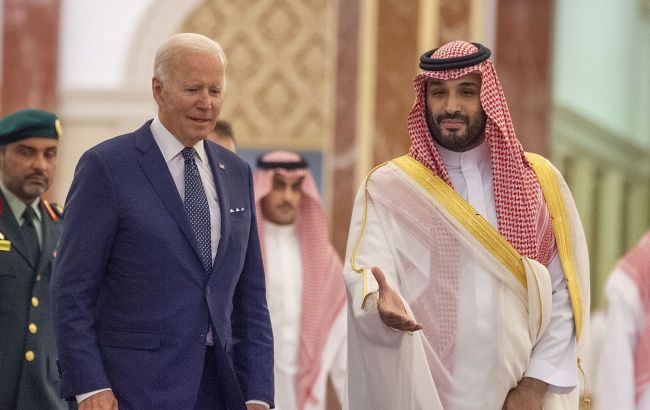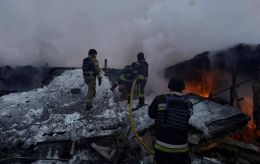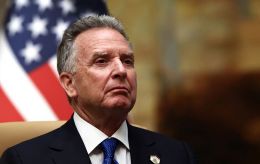Saudi Arabia resumed talks on defense cooperation with U.S.
 Saudi Crown Prince Mohammed bin Salman and U.S. President Joe Biden (photo: Getty Images)
Saudi Crown Prince Mohammed bin Salman and U.S. President Joe Biden (photo: Getty Images)
Saudi Arabia has resumed talks with the U.S. about forging closer defense ties. The dialogue had been suspended after a pause following the start of the Israel-Hamas war in early October of last year, according to Bloomberg.
It is reported that in early January, negotiations took place in the town of Alula in northwestern Saudi Arabia between the de-facto ruler, 38-year-old Crown Prince Mohammed bin Salman, and a group of U.S. senators.
On the agenda was a revival of earlier negotiations about a defense pact that would also have included a historic tie-up between Saudi Arabia and Israel.
The agency notes that Mohammed bin Salman still sees opportunities for greater U.S. cooperation despite anger across the Arab world's discontent over Israel's military strikes in Gaza and the significant loss of Palestinian civilian lives.
A major stumbling block to the talks is that Saudi Arabia has long said any deal with Israel would be conditional on the creation of an independent state for Palestinians, an issue firmly opposed by Israeli Prime Minister Benjamin Netanyahu’s government.
Saudi Arabia and the U.S. share a common interest in countering the Houthi group in Yemen, with whom Mohammed bin Salman is seeking a peaceful settlement after a decade-long conflict. Currently, the U.S. and its allies conduct airstrikes against Houthi positions in response to ongoing attacks on ships in the Red Sea, negatively impacting global trade.
"MBS himself is focused first and foremost on repairing and bolstering the defense relationship with Washington. Demonstrating that Saudi Arabia is a safe place despite surrounding conflicts has become more urgent as the country tries to bring some of the world’s biggest corporations, investors and tourists to the country, all part of an ambitious plan to transform the Saudi economy," writes Bloomberg.
Bilal Saab, the Director of the Defense and Security Program at the Washington-based Middle East Institute for Near East Policy, noted that one immediate priority for MBS and the Saudi leadership is to persuade Biden to ease or lift a freeze on the sale of offensive weapons imposed on the kingdom three years ago, to replenish stockpiles of missiles, bombs, and precision-guided munitions. Sanctions were imposed against the kingdom three years ago.
According to Saab, these weapons are already tied to the U.S. Washington plays the role of the primary arms supplier to Saudi Arabia, and the majority of the kingdom's weaponry comes from American manufacturers.
"Saudi Arabia believes strongly there are no viable alternatives to its defense and security relationship with Washington," noted Mark Dubowitz, chief executive of the Foundation for Defense of Democracies, who is close to Israeli, Saudi, and American officials involved in normalization talks.
He also pointed out that due to the complexities that come with needing a government in Israel willing to entertain a two-state solution with Palestinians, bolstering the U.S.-Saudi defense relationship may be the only doable piece in the short term. According to him, the current Saudi message to all American officials is: "We need America and America needs us."
Talks between Saudi Arabia and Israel
Officially, Saudi Arabia does not have diplomatic relations with Israel; however, on September 10, 2023, Israeli diplomats officially visited the country for a meeting of the UNESCO World Heritage Committee.
On October 7, after a terrorist attack by the Islamist group Hamas from the Gaza Strip, Riyadh called for immediate de-escalation, protection of civilians, and self-restraint. The country's Ministry of Foreign Affairs stated that the war began due to the ongoing occupation and the deprivation of the Palestinian people of their legitimate rights.
On October 14, Saudi Arabia suspended talks on the normalization of relations with Israel, mediated by the U.S.
Escalation in the Middle East
Negotiations between the U.S. and Saudi Arabia resume against the backdrop of a drone attack on the American military base Tower 22 in northeastern Jordan. Three people were killed, and around 40 servicemen were injured in the strike.
Defense Secretary Lloyd Austin threatened a response to the attack. President Joe Biden has already determined the measures in response to the strike.
According to Bloomberg, the attack in Jordan will elicit a more decisive response than any other operations conducted by the U.S. since the beginning of the conflict between Israel and Hamas in the Gaza Strip.

